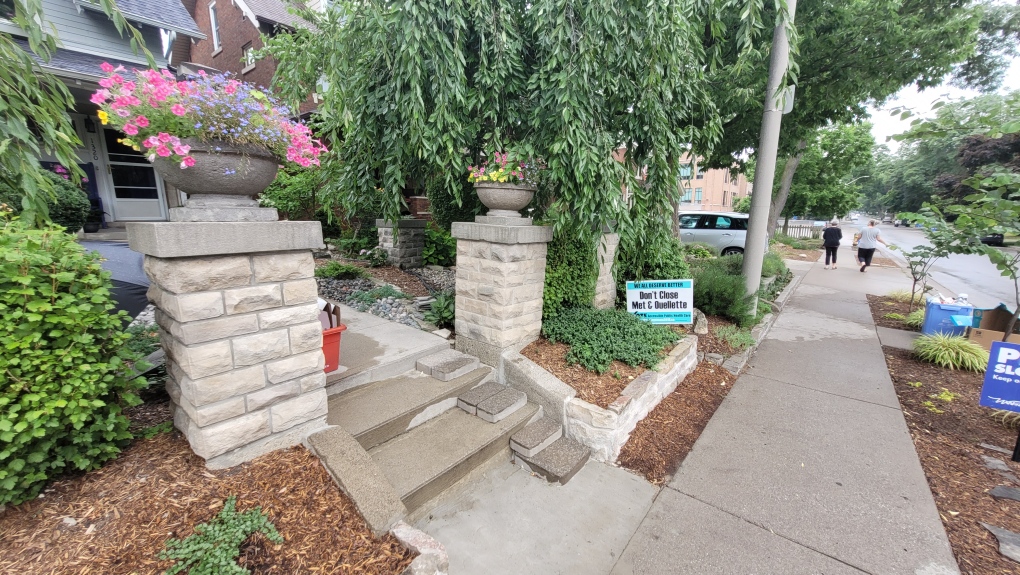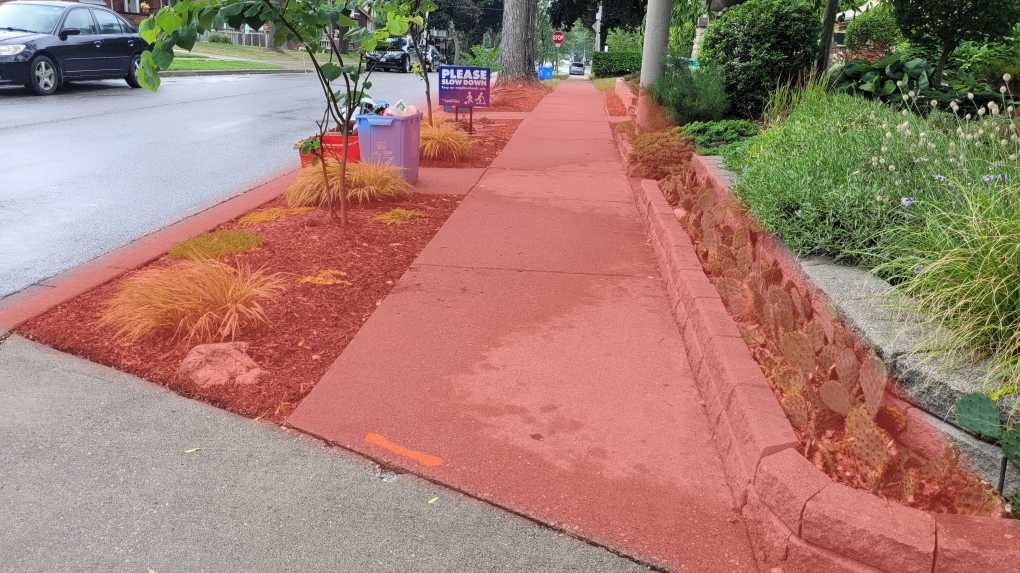Windsor neighbours call city’s rules prohibiting plants and stones near sidewalk 'archaic'
A group of neighbours in Windsor, Ont., are hoping the city will reverse a bylaw that prohibits residents from placing plants and other personal items near the sidewalk without a permit — but city officials say the bylaw is needed to ensure everyone’s safety.
Following a complaint regarding the landscaping outside her home, Elizabeth Hanes received an order by the city which noted she and three other homes on the block were in violation of Bylaw 25-2010.
In short, it prohibits “signs, fences, decorative or landscape rocks or boulders, logs, raised planter beds, planters, trees or shrubs, or…any decorative landscape features” from being placed along the municipal right-of-way.
The municipal right-of-way is considered to be one foot from the edge of the lawn to the end of the curb which includes the small strip of land in front of the sidewalk.
Hanes and three other neighbours living on Victoria Avenue received a follow-up order on July 18.
According to documents issued by the city, the homeowners now have until Aug. 2 to “remove personal property from the public right-of-way and reinstate the boulevard to City of Windsor standards.”
For Hanes, the original order came “out of the blue” since one of the four homeowners had naturalized their yard about 15 years ago.
“I feel like this bylaw is very archaic,” she says. “On one hand, the city is saying…we want to have more naturalized areas and have people appreciate these naturalized areas. Then, on the other hand, they're saying no.”
Hanes said her sidewalk easement has mulch in it with low ground cover. Along the edge of her lawn is a stone border that has been in place for about 15 years.
 Judith McCollough said her home has Heritage designation and these pillars were part of it when she bought the property decades ago. The city has ordered her to remove them as they are too close to the sidewalk. (Sanjay Maru/CTV News Windsor)
Judith McCollough said her home has Heritage designation and these pillars were part of it when she bought the property decades ago. The city has ordered her to remove them as they are too close to the sidewalk. (Sanjay Maru/CTV News Windsor)
To comply with the city’s order, all of that would have to be removed.
“That's why we started a petition on Saturday, asking residents to sign it so that we can change the bylaw regarding easements and one foot on the other side of the sidewalk,” she says.
Hanes adds, “If you take a look at the City of Guelph’s bylaw regarding easements, it is very progressive. Not only are they saying you can have other ground cover, they're encouraging people because they're recognizing that it is good for pollinators. It is good for trying to keep water from flooding into our systems.”
Another neighbour who received a similar order, Judith McCullough, has pillars at the front of the walkway leading to her front door. Due to its proximity to the sidewalk, the city has ordered her to remove the pillars — even though they were part of the original design of her home which, she says, has heritage designation.
“As a senior, I’m doing what I can to live in this house,” says McCullough. “My neighbor's have had their lawns naturalized for ten or twelve years.”
Andrew Lewis, coordinator of right-of-way and field services for the City of Windsor, said the existing rules have nothing to do with stopping homeowners from naturalizing their properties.
Rather, it’s about ensuring passersby do not, for example, kick stones or mulch on to the sidewalk where a cyclist could possibly ride over it and fall.
“The engineering best practice for landscaping in the right-of-way exists to try to limit the liability. When adjacent property owners want to beautify the public right-of-way, it has to be done in a safe manner,” says Lewis.
He said the city’s “best practices” for landscaping allow for items such as flowers, plants, bushes or shrubs to be placed within 0.3 metres (one foot) of the sidewalk — as long as the property owner has a permit or signed encroachment agreement to put them there.
The height of said plants can not exceed 0.9 metres (three feet), he added, and all personal items placed along the easement must be maintained to ensure they don’t risk being transferred to the public sidewalk.
“The City of Windsor encourages beautification of our beautiful city, as long as the landscaping is undertaken adhering to the best practice,” says Lewis.
 The red area indicates where a Windsor homeowner can not place personal items, without a permit or encroachment agreement, due to the city’s existing rules surrounding landscaping. (Sanjay Maru/CTV News Windsor)
The red area indicates where a Windsor homeowner can not place personal items, without a permit or encroachment agreement, due to the city’s existing rules surrounding landscaping. (Sanjay Maru/CTV News Windsor)
Ward 3 city Coun. Rino Bortolin estimates there are “tens of thousands” of homes in Windsor that unknowingly violate the city’s best practices.
“For example, if you drive along in a neighborhood and see a big huge boulder at the corner of a driveway that's right on the street, that is technically on city property and would need an encroachment agreement,” he says, adding the existing rules around landscaping are complaint-based.
Bortolin adds, “If somebody in the neighborhood was walking by, tripped, fell, hurt themselves or just called the city to complain, then by-law has to go out and take action on it because it becomes a liability for the city at that point.”
Bortolin says the city made changes to the landscaping bylaw back in April, permitting plants “under four inches” in height. Prior to that, the public right-of-way could only be covered in grass or AstroTurf.
But he added red tape needs to be reduced so homeowners can naturalize their properties however they like, as long as it’s done safely.
“Instead of putting up roadblocks, like permits and encroachment fees, we should be encouraging it and working with them to make it as easy as possible,” says Bortolin. “I think that's the problem here. It's not so much some of the rules. Some of the rules, I think, do make sense.”
According to city officials, a public works permit currently costs $212.
After paying that fee, Bortolin says an inspector would need to visit a homeowner’s property to ensure the placement of their landscaping items comply with city bylaws.
“I think the conversation should be how we can reduce that barrier to actually do something good and beautify the right-of-way for people and also make it more naturalized. If we are doing things like good ground cover that’s good for rain, storm water runoff and things like that, then we should be encouraging that,” he says.
As examples, he believes the city could subsidize existing permits or allow residents to opt-in to a program — similarly to Windsor’s rental licensing program — in which anyone who has not opted in would have to pay all the fines associated with a landscaping complaint.
Bortolin says enforcement of the order, issued to the four homes on Victoria Avenue on July 18, has been placed on hold.
The Ward 3 representative said he plans on bringing up this topic at city council’s next meeting in August.
CTVNews.ca Top Stories

Southern California wildfire destroys many structures; governor declares state of emergency
A wildfire whipped up by extreme winds swept through a Los Angeles hillside dotted with celebrity residences Tuesday, burning homes and forcing the evacuation of tens of thousands of people.
Trump is open to using 'economic force' to acquire Canada; Trudeau responds
Prime Minister Justin Trudeau said 'there isn’t a snowball’s chance in hell that Canada would become part of the United States,' on the same day U.S. president-elect Donald Trump declared that he’s open to using 'economic force' to acquire Canada.
A B.C. mom's real-life nightmare and the search to find her trafficked daughter
A Vancouver island mom shares the story of what happened to her teenaged daughter – and a warning for other parents about sex trafficking.
Liberal leadership hopeful Frank Baylis noncommittal on eliminating consumer carbon tax
Liberal leadership hopeful Frank Baylis says eliminating the consumer carbon tax alone will not 'solve the affordability issue for Canadians.'
Canadian naval vessel shadowed by Chinese war ship in the East China Sea
CTV National News is on board the HMCS Ottawa, embedded with Canadian Navy personnel and currently documenting their work in the East China Sea – a region where China is increasingly flexing its maritime muscle. This is the first of a series of dispatches from the ship.
Patient dies in waiting room at Winnipeg hospital
An investigation is underway after a patient waiting for care died in the waiting room at a Winnipeg hospital Tuesday morning.
Limit coffee-drinking to this time window to lower early death risk, study suggests
Drinking coffee has repeatedly been linked with better heart health and prolonged life. But the benefits of coffee consumption could depend on when you drink it, new research has found.
B.C. 'childbirth activist' charged with manslaughter after newborn's death
A British Columbia woman who was under investigation for offering unauthorized midwifery services is now charged with manslaughter following the death of a newborn baby early last year.
Man who exploded Tesla Cybertruck outside Trump hotel in Las Vegas used generative AI, police say
The highly decorated soldier who exploded a Tesla Cybertruck outside the Trump hotel in Las Vegas used generative AI including ChatGPT to help plan the attack, Las Vegas police said Tuesday.


































